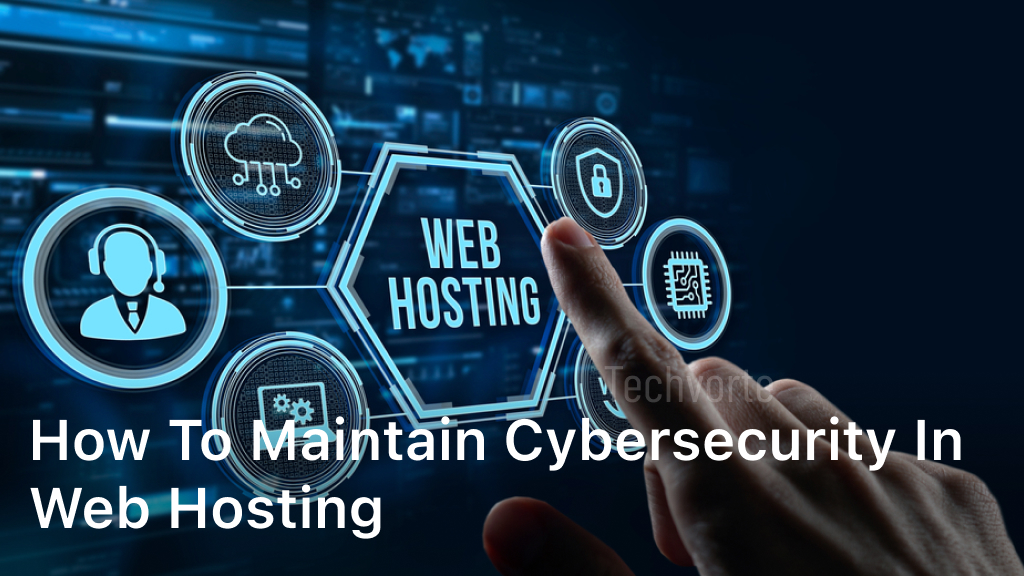In an era dominated by digital presence, cybersecurity has become paramount, especially in the realm of web hosting.
Whether you’re managing a personal blog, an e-commerce site, or a corporate portal, safeguarding your online assets against cyber threats is crucial.
Here’s a comprehensive guide on how to maintain cybersecurity in web hosting, along with some frequently asked questions (FAQ) to help you navigate through the intricacies of online security.
Understanding Cyber Security in Web Hosting

When it comes to establishing a solid online presence, businesses must prioritize web hosting security.
This necessity goes beyond mere precaution; it is the backbone that supports trust and reliability in the digital marketplace.
As such, understanding the intricacies of secure server hosting becomes paramount for any online venture.
In this segment, you’ll gain insights into how web hosting encryption and diligent practices are safeguarding online businesses against cyber threats.
The Importance of Cybersecurity for Online Businesses
Today’s digital ecosystem demands robust cybersecurity defense mechanisms.
Online businesses, small or large, face constant threats that can disrupt operations and compromise sensitive data.
The importance of implementing web hosting security best practices cannot be overstated, with tangible benefits ranging from protected customer information to safeguarded business intelligence, ultimately translating to sustained business continuity and growth.
Defining Cyber Threats in the Web Hosting Environment
- Distributed Denial of Service (DDoS) attacks, which flood servers with traffic to cause disruptions
- Malware and ransomware that can steal or encrypt vital business data
- Phishing scams aimed at employees to gain unauthorized access to hosting accounts
- SQL injection attacks that can alter or retrieve information from databases without permission
Identifying these threats is the first step toward mitigation and underscores the importance of working with secure server hosting providers equipped to handle such challenges.
Impact of Data Breaches on Web Hosting Reputation
A data breach can be catastrophic, not just in terms of financial loss, but also concerning a web host’s reputation. Trust is a currency in the digital realm and once that is lost, it becomes challenging to regain.
Swift and secure handling of data breaches, with clear communication and remediation measures, is essential.
After all, the reputation of both web host and client hinges on cybersecurity measures that are comprehensive and effective.
Essential Web Hosting Security Best Practices
In an online world where threats loom behind every click, applying rigorous web hosting security measures is not just prudent, it’s critical.
Let’s delve into the essential best practices that fortify your online presence against unwanted intrusions.
Creating Unbreakable Passwords: The frontline defense of any account is its password. Use complex combinations of letters, numbers, and special characters to create a strong password, and update it regularly.
Regular Software Updates: Cybercriminals exploit vulnerabilities in outdated software. Ensure that all platforms, applications, and scripts are up-to-date with the latest security patches and versions.
Routine Backups: Backups are your safety net in the event of data loss or cyber-attacks. Perform regular backups of all your data, and store them in multiple secure locations.
Implementing Hosting Security Protocols: Work with your web host to ensure they have robust cybersecurity measures in place, including firewalls, network monitoring, and intrusion detection systems.
By embracing these best practices, you craft a resilient shield around your web assets.
Remember, hosting security protocols are not just a feature, but a necessary standard for safeguarding your digital footprint.
Secure Hosting Solutions
With a spectrum of hosting options available today, discerning the most secure solution is crucial for businesses aiming to protect their online infrastructure.
Securing sensitive data and maintaining high availability are indispensable for modern online operations.
Hence, choosing a hosting service tailored for robust security features is not only beneficial but imperative for any business committed to maintaining a strong digital presence.
Selecting a Web Host with Robust Security Features
Selecting a web host is a pivotal decision for business owners.
Key security features such as firewalls, SSL certificates and regular malware scanning can vastly reduce vulnerability to cyber attacks.
Opting for a web host that prioritizes web hosting protection through ongoing security monitoring and has a proven track record of maintaining secure server hosting should be at the top of your criteria list.
Managed Vs Unmanaged Hosting, Which is More Secure?
When debating between managed and unmanaged hosting, the scale tilts in favor of managed hosting for those seeking enhanced security.
Managed hosting providers take the reigns in overseeing server maintenance, including security patches and software updates, offloading clients from the technical burden and allowing them to focus more on their business’s strategic aspects.
Unmanaged hosting, while often less expensive, requires users to handle security measures themselves, a task for which not all businesses are equipped.
Benefits of Cloud-Based Secure Server Hosting
The agility and resilience of cloud-based hosting make it an attractive proposition for businesses of all sizes.
It offers scalability to handle fluctuating traffic and resources, combined with advanced security protocols that can be updated seamlessly.
Companies enjoy the peace of mind that comes from using distributed resources, which contributes to mitigating data loss and downtime risks in events such as DDoS attacks.
Ultimately, the cloud stands as a forerunner in hosting solutions that harmonize flexibility with robust security measures.
Implementing Hosting Security Protocols
At the heart of reliable web hosting lies a shield of comprehensive security protocols.
Their importance in fortifying data against cyber threats cannot be overstated.
From SSL certificates to firewall management, these layers of security ensure that your online endeavors operate within a bastion of digital safety.
Here, we explore the cornerstones of web hosting protection and how they contribute to a more secure internet landscape.
SSL Certificates and Data Encryption
SSL certificates are foundational to establishing a secure connection between a web server and a client.
By enabling web hosting encryption, they encrypt data transmitted over the internet, ensuring that any sensitive information exchanged remains confidential and protected from eavesdroppers.
Here’s how they benefit your web hosting setup:
- Encrypts sensitive data such as login credentials and financial transactions.
- Boosts customer trust by displaying security indicators like the padlock icon in browsers.
- Improves search engine rankings as search engines prioritize secure websites.
Firewall and DDoS Protection Strategies
In an online world where cyber threats are continuously evolving, a robust firewall and comprehensive DDoS protection strategies form the bulwark against attacks that can cripple your website.
These defensive measures serve to:
- Screen incoming and outgoing network traffic to block malicious packets.
- Provide a set of rules that govern what type of communications are permitted.
- Offer real-time protection against DDoS attacks, preventing service disruption.
Secure File Transfer Protocols
Transferring files securely is a critical element of web hosting security, protecting data integrity and confidentiality during uploads or downloads.
Secure file transfer protocols like SFTP (SSH File Transfer Protocol) and FTPS (File Transfer Protocol Secure) bring fortified layers for data in transit, ensuring:
- Encryption of files during transfer, thwarting attempts to access or alter the data.
- Authentication of user credentials to prevent unauthorized file access.
- Integrity checks that confirm complete and accurate transfer of files.
Implementing these hosting security protocols forms an interwoven shield against a multitude of cyber threats, preserving the sanctity of your online presence.
Web Hosting Encryption Techniques
In the realm of web hosting, encryption serves as a silent guardian against data breaches and cyber espionage.
It is a potent tool within the arsenal of cybersecurity measures, ensuring that even if data were intercepted, it would remain a labyrinthine puzzle to the intruder.
This section spotlights the various encryption techniques deployed in web hosting and underscores their significance in the grand schema of digital protection.
Core to web hosting encryption are algorithms complex mathematical formulas that convert plaintext into ciphertext.
These algorithms include stalwarts like RSA, DSA and AES, each with distinctive characteristics and levels of security.
Choosing the right algorithm is crucial, as it balances the need for security with the performance of web hosting services.
Yet, encryption’s strength doesn’t hinge solely on algorithms.
Key management stands as its pivotal companion, involving the creation, distribution, storage and destruction of encryption keys.
Handling this key lifecycle with precision prevents unauthorized access to encrypted data.
The robustness of your cybersecurity measures is thus deeply entwined with these procedural aspects.
- Encrypting data at rest and in transit to mitigate the risk of theft or snooping
- Adopting Secure Sockets Layer (SSL) and Transport Layer Security (TLS) for establishing an encrypted link between a server and a client
- Ensuring the secure configuration of SSL to close off vulnerabilities against attacks like Heartbleed and POODLE
- Employing encryption for databases housing sensitive information to fortify them against SQL injection and similar threats
As part of the grander hosting security protocols, encryption does not act alone.
It integrates with technologies such as HTTPS and VPNs to create a multilayered defense against cyber incursions.
Through the proper implementation of these techniques, businesses and individuals can confidently secure their online presence against the burgeoning tide of internet-based threats.
Conclusion
As we encapsulate the insights from our comprehensive navigation through the realm of web hosting security, it’s paramount to underscore the enduring importance of stringent cybersecurity measures in sustaining a secure online presence.
The digital landscape we venture upon is fraught with threats however, adequate preparation and proactive defense can significantly mitigate these perils.
We’ve explored and advocated for a synergy between web hosts and clients, emphasizing the shared onus to implement robust web hosting protection strategies.
Human vigilance, paired with advanced technological safeguards, forms a formidable barrier against the incursions of cyber adversaries.
It’s not enough to establish defenses, we must also nurture a culture of continual enhancement and education.
Clients and service providers alike should stay informed on the best practices, trends and evolution of threats.
To navigate the currents and undercurrents of the cyberworld, one’s commitment must be to an ever-vigilant, adaptive approach.
Whether you’re at the helm of a burgeoning startup or steering an established enterprise, let acute awareness and educated decisions guide you.
It is this unyielding dedication to excellence in web hosting security that will enable businesses, big and small, to flourish securely in the boundless digital expanse.
FAQ
What is the role of SSL/TLS certificates in web hosting security?
SSL/TLS certificates encrypt data transmitted between web servers and users’ browsers, ensuring confidentiality and integrity. They also help establish trust with visitors by displaying a padlock icon and HTTPS protocol in the browser address bar.
How often should I update my web hosting platform and software?
It’s advisable to update your web hosting platform, CMS, plugins, and other software as soon as security patches and updates are released. Delaying updates increases the risk of exploitation by cybercriminals.
What should I do if my website is compromised?
If your website is compromised, take immediate action to contain the breach, such as restoring from backups, removing malicious code, and patching vulnerabilities. Notify your hosting provider and consider involving cybersecurity experts to investigate the incident and prevent future attacks.
Is shared hosting less secure than dedicated hosting?
Shared hosting environments host multiple websites on the same server, increasing the risk of security vulnerabilities and data breaches compared to dedicated hosting. However, implementing proper security measures can mitigate these risks effectively in shared hosting setups.





